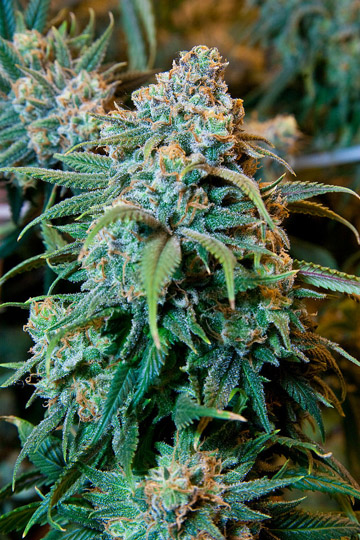P.R.’s budding cannabis sector ‘vulnerable’ after US DOJ policy change


Puerto Rico’s medical marijuana sector is vulnerable to federal intervention. (Credit: Wikipedia)
Puerto Rico’s budding medicinal cannabis industry has been put in a tough spot after the U.S. Department of Justice reverted a number of guidance documents regulating the cultivation, distribution and possession of marijuana.
On Thursday, U.S. Attorney General Jeff Sessions issued a memorandum invalidating the so-called “Cole Memo” issued in 2013 under the Barack Obama administration, which opened the doors to medical cannabis in the states and territories as independent jurisdictions.
The decision could be detrimental to the cannabis industry, not only in Puerto Rico but also at the national level, Aldarondo said. In Puerto Rico, the problem is more serious because of particular circumstances the industry is dealing with after Hurricanes Irma and María hit.
For the past three months, the sector has been operating under a moratorium allowing it to do business without complying with certain regulatory requirements, including running surveillance cameras and having 24-hour security, Puerto Rico Legal Marijuana President Goodwin Aldarondo confirmed.
“The biggest protection we have is to fully comply with Regulation 8766a and Law 42. However, right now, the most vulnerable cannabis industry territory is Puerto Rico, because after the hurricanes, many businesses are operating without security cameras, inventory tracking systems, and the Medicinal Cannabis Regulatory Board granted an indefinite moratorium on expired licenses,” he said.
“So today, we have medicinal cannabis clinics, manufacturing and cultivation operations running with expired licenses,” he said. “We don’t know when that moratorium will end. It’s going on three months — we have patients and doctors with expired licenses.”
These circumstances could be grounds for federal authorities to intervene with the sector and its components, Aldarondo confirmed.
“I’m worried that we’re very vulnerable. Perhaps we’re not the target for federal authorities, but we could be an example. And I’m worried because we have that situation, among others that make us vulnerable before the U.S. government,” Aldarondo said. “The board has been too lenient allowing too many businesses to operate without meeting regulations.”
Aldarondo said the Association would ask the regulatory board to immediately end the moratorium and enforce the regulations and law, otherwise we’re asking for an end of the industry that has some 30 open clinics, 11 harvesting operations and five manufacturing operations.
Sessions turns controls over to federal prosecutors
In its memo on marijuana enforcement, Sessions directed all U.S. Attorneys to enforce the laws enacted by Congress and to follow established principles when pursuing prosecutions related to marijuana activities.
“This return to the rule of law is also a return of trust and local control to federal prosecutors who know where and how to deploy Justice Department resources most effectively to reduce violent crime, stem the tide of the drug crisis, and dismantle criminal gangs,” Sessions said.
“It is the mission of the Department of Justice to enforce the laws of the United States, and the previous issuance of guidance undermines the rule of law and the ability of our local, state, tribal, and federal law enforcement partners to carry out this mission,” said Sessions.
“Therefore, today’s [Thursday’s] memo on federal marijuana enforcement simply directs all U.S. Attorneys to use previously established prosecutorial principles that provide them all the necessary tools to disrupt criminal organizations, tackle the growing drug crisis, and thwart violent crime across our country,” he said.
The memorandum and the “Cole Memorandums” of 2011, 2013 and 2014, provide guidance to U.S. prosecutors regarding the enforcement of federal cannabis laws, representatives from Canada-based CannaRoyalty Corp. confirmed.
However, Session’s directive “is not law nor does it alter the U.S. Justice Department’s discretion or ability to enforce federal marijuana laws. U.S. prosecutors will continue to have discretion in how they enforce federal marijuana laws, as they had under the Cole Memorandums,” the company stated.
“No legal change has taken place here. We do not foresee the Memorandum meaningfully impacting the way that existing cannabis business is conducted within legal states,” said Marc Lustig, CEO of CannaRoyalty. “The evidence from legal states demonstrates that legalizing and regulating cannabis consumption works.”
“It is our belief that this Memorandum has more to do with the DOJ’s desire to ensure its ability to continue to enforce federal law without specific enforcement priorities regarding cannabis, than it does to disrupting ongoing state-legal cannabis activity,” he said.
“To enforce federal cannabis restrictions within legal states, the DOJ would be enforcing a historical federal policy that is contrary to the desire of roughly two-thirds of the U.S. population, including the majority of Republicans,” said Lustig.
“This would also be directly contrary to President Trump’s campaign assertion that marijuana policy should be left in the hands of the states and contrary to the trend toward legalization within U.S. states; the Vermont House of Representatives voted earlier today to legalize possession and home cultivation of marijuana,” he said.
Legal states have built significant infrastructure to prudently handle the legal cannabis industry, they are relying on tax revenues from the industry and their citizens are relying on the private sector jobs that legalization has created. CannaRoyalty operates exclusively within state-legal U.S. jurisdictions, Puerto Rico as well as in Canada, and adheres strictly to applicable laws, the executive said.
“While the release of the Memorandum may mean some volatility for U.S. players over the short-term, we see significant opportunity for growth over the coming year and will continue to work to drive value for our shareholders,” he said.
Rosselló will challenge public policy
Puerto Rico Gov. Ricardo Rosselló blasted the federal decision, saying the “change is a setback caused by the lack of awareness of the scientific evidence, which points to the benefits of cannabis to the health of the citizens that suffer some health conditions.”
“I have instructed my cabinet members to be vigilant of the development of this new public policy of the federal government, and to join any legal actions that arise to defeat it,” he said.
The local government will be combining efforts with other states and members of Congress to promote measures, such as Rorahbacker-Farr, which prohibits the U.S. Department of Justice to use public funds to try or arrest patients or providers of medicinal cannabis that comply with state laws, he said.
“I reiterate my support to the medicinal cannabis industry in Puerto Rico, which has contributed to the improvement of the quality of life of over 16,000 patients, and has generated over 30,000 direct jobs,” Rosselló said.
“I urge all of the industry members to adhere strictly to our law and regulations to continue demonstrating that in Puerto Rico we have a serious, responsible, and completely medicinal industry,” he concluded.












